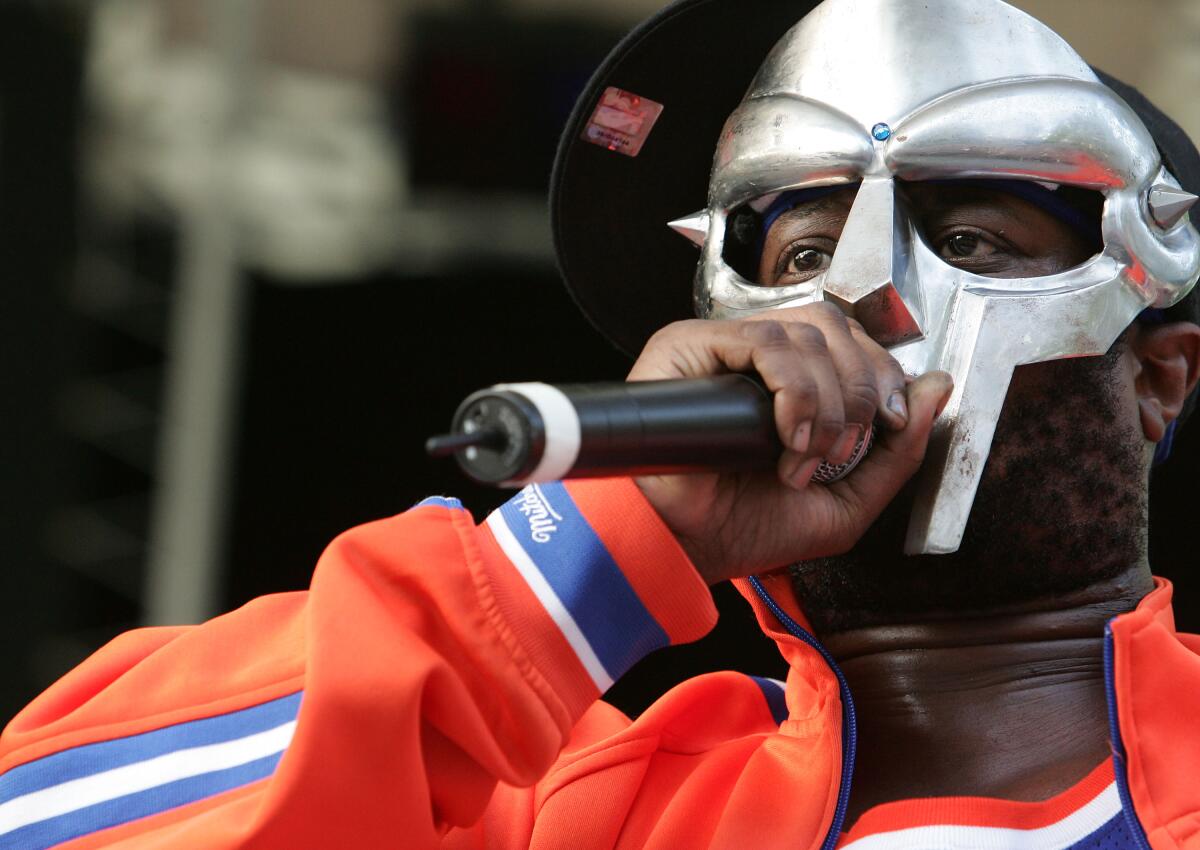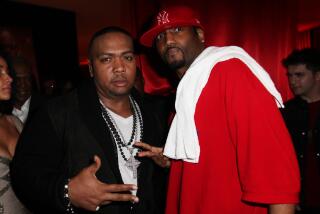MF Doom, masked and masterful rap artist, dies at 49

- Share via
MF Doom, the cerebral and willfully mysterious rapper and producer beloved by hip-hop connoisseurs for the complex rhymes he delivered from behind a metallic mask, has died. He was 49.
His death was announced Thursday in an Instagram post signed by his wife, Jasmine, who said that Doom had “transitioned” on Oct. 31. A spokesman for Rhymesayers, a record label for which Doom recorded, confirmed his death. No cause was given.
Known for close collaborations with producers such as Madlib and Danger Mouse — and for his use of a variety of alter egos including King Geedorah and Viktor Vaughn — Doom, born Daniel Dumile, cut a proudly idiosyncratic path through rap music in the 1990s and 2000s, burrowing deep into a self-made comic book-style mythology even as hip-hop reached increasingly commercial heights in the pop mainstream.
His music was dense but funky, gloomy yet streaked with an off-kilter sense of humor, and his records — full of songs about food and cartoons and time travel and race — helped clear a path for younger hip-hop eccentrics like Playboi Carti and Tyler, the Creator, two of the many admirers who lamented Doom’s death Thursday on social media.
“My soul is crushed,” Flying Lotus tweeted, before adding that 2004’s “Madvillainy” album was “all u ever needed in hip hop.” On Instagram, El-P of Run the Jewels thanked Doom “for keeping it weird and raw always.”
Born in London and raised on Long Island, Doom — then performing under the name Zev Love X — broke out in 1989 with a memorable appearance in “The Gas Face,” a loopy hit by 3rd Bass that had a music video featuring cameos by Gilbert Gottfried and Public Enemy’s Flavor Flav.
The positive attention led to a major-label deal for KMD, a duo Doom shared with his younger brother, Dingilizwe, known as DJ Subroc; they released their debut, “Mr. Hood,” in 1991, thinking of themselves as “straight-up teachers,” as Doom told Spin magazine in 2004.

“My mother raised us with Islam,” he said. “And then my father … always taught us about our people, about Marcus Garvey and the Honorable Elijah Muhammad. But when I started junior high school, I realized motherf— didn’t know about these people! So I was like, ‘Let’s spread the word’.”
In 1993, as the brothers worked on a follow-up, Subroc was killed in a car accident; Doom finished the album, called “Black Bastards,” but KMD’s label, Elektra, declined to put it out, reportedly because its cover art depicted a Sambo character hanging from a noose. (The highly bootlegged “Black Bastards” finally got an official release in 2001.)
Doom receded from public view after his brother’s death — he had a son but also spent time “damn near on the verge of being homeless,” as he told Spin — then reemerged in the late ’90s in the masked guise he would inhabit for the rest of his career.
Of his decision to hide his face, he said in a 2009 interview with Ta-Nehisi Coates in the New Yorker, “I wanted to get onstage and orate, without people thinking about the normal things people think about. Like girls being like, ‘Oh, he’s sexy,’ or ‘I don’t want him, he’s ugly,’ and then other dudes sizing you up. A visual always brings a first impression. But if there’s going to be a first impression I might as well use it to control the story.”
His debut as MF Doom, “Operation: Doomsday,” came out in 1999 with a cover image that evoked the Marvel character Doctor Doom; the rapping was tricky and allusive — and all the stranger for being accompanied by beats (produced by Doom himself) that pulled from pillowy ’80s R&B.

Doom worked steadily over the next decade, teaming with Madlib for “Madvillainy,” which finished at No. 11 on the Village Voice’s annual Pazz & Jop critics poll, and with Danger Mouse for 2005’s “The Mouse and the Mask,” which grew out of a collaboration with the Cartoon Network’s oddball Adult Swim programming block. His most recent solo album, “Born Like This,” was released in 2009.
In concert, Doom was known to send masked imposters onstage in his place, a tactic he said reflected his role as the “writer” and “director” of the MF Doom project. “I might send a white dude next,” he told the New Yorker. “Whoever plays the character plays the character.”
In 2017, Doom wrote on Instagram that his son, King Malachi Ezekiel Dumile, had died at age 14. Information on survivors beyond his wife wasn’t immediately available.
More to Read
The biggest entertainment stories
Get our big stories about Hollywood, film, television, music, arts, culture and more right in your inbox as soon as they publish.
You may occasionally receive promotional content from the Los Angeles Times.










